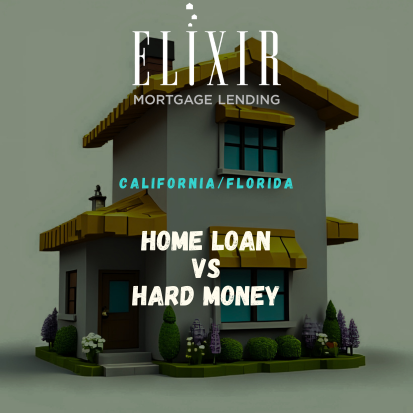
Home Loans vs. Hard Money Loans: Which is Right for Your Investment Goals?
When investing in real estate, you often face a choice between home loans and hard money loans. Each has distinct advantages, and the best option depends on your goals, timeline, credit history, and property strategy. For beginners, understanding the differences is critical. A home loan prioritizes long-term affordability and stability, while a hard money loan emphasizes speed, flexibility, and short-term use. Choosing between them can be challenging, especially with fluctuating mortgage rates and varying lender requirements.
Verify my mortgage eligibility (Mar 4th, 2026)This comprehensive guide explores home loans versus hard money loans, their structures, and how to determine the best loan type for real estate investment based on your strategy.
How Traditional Lending Works for Home Purchases
A home loan, often called a mortgage, is the primary financing method for buying a home. Provided by banks, credit unions, and other established lenders, these loans are structured for long-term repayment, typically over 15 to 30 years.
Key Features of Home Loans
Verify my mortgage eligibility (Mar 4th, 2026)- Lower Interest Rates: Mortgage rates today are generally lower than other financing options, especially for borrowers with excellent credit.
- Extended Repayment: Spread over decades, monthly payments are predictable and manageable.
- Credit-Based Approval: Lenders heavily rely on credit history, income stability, and debt-to-income ratio.
- Highly Regulated Process: Mortgages adhere to strict regulations, ensuring consumer protection with clear terms and oversight.
- Down Payment Requirements: The down payment for a home loan varies based on the loan type, such as FHA, VA, or Conventional, and can range from a small percentage to a larger portion of the home’s purchase price.
When Are Home Loans Best?
Home loans are ideal for:
- Long-term property ownership, such as rentals or primary residences.
- Investors seeking consistent monthly cash flow.
- Buyers with strong credit profiles.
- Individuals aiming to lock in low mortgage rates today for cost savings.
For investors prioritizing stability and affordability, a home loan is often the best loan type for real estate investment when seeking reliable, low-cost financing.
What is a Hard Money Loan?
A hard money loan is a short-term, asset-based financing solution provided by private investors or specialized lending companies. Unlike traditional loans, approval focuses on the property's value rather than the borrower's creditworthiness.
Key Features of Hard Money Loans
- Asset-Based Lending: Approval hinges on the property's value and potential.
- Speed: Funding is available in days, ideal for competitive markets.
- Short Terms: Typically lasting 6 months to 3 years.
- Higher Interest Rates: Rates range from 8% to 15%, compared to single-digit mortgage rates today.
- Flexible Structure: Terms can be tailored to unique projects.
When Are Hard Money Loans Best?
Hard money loans are suited for:
- House flipping or fix-and-flip projects.
- Competitive markets where timing is critical.
- Investors with lower credit but strong collateral.
- Transitional financing until long-term loans are secured.
For investors valuing speed, flexibility, and high-return opportunities, hard money loans are often the best loan type for real estate investment.
Hard Money Lending for Beginners
Navigating hard money lending for beginners can feel daunting. Here are the essentials:
Verify my mortgage eligibility (Mar 4th, 2026)- Collateral is Key: The property serves as security. Defaulting risks losing it.
- Higher Costs: Expect interest rates between 8% and 15%.
- Shorter Repayment Terms: Plan for a clear exit strategy, such as selling, refinancing, or transitioning to a home loan.
- Relationships Matter: Many lenders are local and value repeat business.
Hard money loans should be part of a strategic plan, not a substitute for traditional financing.
Home Loan vs. Hard Money Loan: A Detailed Comparison
Understanding the differences between a home loan and a hard money loan is crucial before deciding. Each suits specific clients and projects. Below are the key factors:
Approval Process
- Home Loan: Approval relies heavily on credit history, income stability, and financial background. Lenders scrutinize debt-to-income ratios and credit scores.
- Hard Money Loan: The property's value and potential outweigh the borrower's credit history, making it accessible for those with lower credit.
Speed
Verify my mortgage eligibility (Mar 4th, 2026)- Home Loan: Processing takes weeks due to extensive paperwork, appraisals, and underwriting.
- Hard Money Loan: Approvals and funding occur within days, perfect for time-sensitive deals.
Interest Rates
- Home Loan: Offers lower rates, often aligning with mortgage rates today, typically in the single digits for qualified borrowers.
- Hard Money Loan: Rates range from 8% to 15% or higher, reflecting the short-term, high-risk nature.
Repayment Terms
- Home Loan: Long-term repayment (15 - 30 years) results in lower, predictable monthly payments.
- Hard Money Loan: Short-term repayment (6 months to 3 years) suits quick-turnaround projects.
Best Use Cases
Verify my mortgage eligibility (Mar 4th, 2026)- Home Loan: Ideal for stable, long-term investments like rentals or primary residences.
- Hard Money Loan: Best for short-term projects, such as house flips or properties requiring quick funding.
Down Payment
- Home Loan: Requires 3% to 20% of the property's value, depending on the loan type.
- Hard Money Loan: Typically demands 20% to 40%, reflecting higher lender risk.
Flexibility
- Home Loan: Less flexible, with rigid terms and regulations.
- Hard Money Loan: Highly flexible, with terms negotiable between investor and lender.
In summary, there's no universal "best" loan. Your choice depends on your investment goals. For long-term purchases, a home loan is often preferable. For quick flips or time-sensitive projects, a hard money loan offers unmatched speed and flexibility.
Verify my mortgage eligibility (Mar 4th, 2026)Impact of Mortgage Rates Today
Mortgage rates today significantly influence financing decisions:
- Low Rates: Home loans become highly attractive for long-term investors. Fixed rates lock in costs, boosting return on investment (ROI).
- High Rates: Some investors pivot to hard money loans for short-term flexibility, avoiding decades of high-cost payments.
Hard money loans are less tied to national rates, as private lenders set their own terms, offering adaptability in volatile markets.
Bridge Loans and Their Role
A bridge loan, provided by a bridge loans lender, is a short-term financing option that helps investors transition between buying a new property and securing long-term financing.
When to Use a Bridge Loan
- Purchasing a new property before selling an existing one.
- Funding renovations before refinancing.
- Transitioning from a hard money loan to a traditional home loan.
Bridge loans serve as a stepping stone to long-term financing solutions.
The Best Loan Type for Real Estate Investment: It's Relative
Choosing the best loan type for real estate investment depends on several factors:
- Investment Strategy: Are you buying to hold, flipping, fixing, or bridging?
- Timeline: Months for quick flips or decades for rentals?
- Credit Profile: Poor credit may limit home loan eligibility, but hard money loans are more accessible.
- Risk Tolerance: Are you comfortable with higher interest rates for faster access?
- Market Conditions: Monitor mortgage rates today to assess borrowing costs.
- Best Use Cases:
- Home loans excel for rentals and long-term investments.
- Hard money loans are ideal for quick deals and flips.
- Bridge loans suit transitional needs.
Real-Life Scenarios
Case 1: The Buy-and-Hold Investor
John wants to purchase a duplex as a long-term rental. With strong credit and favorable mortgage rates today, a home loan offers stability and low monthly payments.
Case 2: The House Flipper
Sarah spots a fixer-upper in a competitive market. She needs to close quickly. A hard money loan enables her to secure the property, renovate, and sell within six months.
Case 3: The Transitional Buyer
David hasn't sold his current home but wants to buy a new one. A bridge loans lender helps him secure the new property without delay.
Case 4: The Airbnb Investor
Priya is buying a short-term rental property in a popular tourist area. Anticipating strong returns, she uses a hard money loan to close quickly, planning to refinance into a home loan later.
Case 5: The Distressed Property Buyer
Mark finds a foreclosure property unfit for traditional bank financing due to its condition. A hard money lender provides the funds to purchase, renovate, and refinance later.
Detailed Instructions: How to Apply for a Loan
Applying for a Home Loan
- Check your credit score.
- Gather income and tax documents.
- Compare mortgage rates today from banks and credit unions.
- Obtain pre-approval.
- Submit a loan application.
- Complete underwriting and appraisal processes.
- Close the loan.
Applying for a Hard Money Loan
Verify my mortgage eligibility (Mar 4th, 2026)- Identify a property with strong equity potential.
- Contact local hard money lenders.
- Provide property details and renovation plans.
- Receive approval, often within the same day.
- Close within days.
Advanced Tips for Choosing the Best Loan Type
- Monitor Mortgage Rates Today: A 0.5% rate difference can save thousands over time.
- Plan an Exit Strategy: Essential for hard money loans to avoid high interest costs.
- Build Lender Relationships: Banks, private lenders, and bridge loans lenders can become valuable partners.
- Match Loan to Timeline: Avoid using a 30-year home loan for a six-month project.
- Consult Professionals: Brokers, real estate agents, and financial advisors can guide your decision.
Common Mistakes to Avoid
- Ignoring Total Costs: Consider fees, penalties, and closing costs, not just interest rates.
- Lacking an Exit Plan: Critical for hard money loans to avoid financial strain.
- Overleveraging: Borrowing too much can lead to losses in market downturns.
- Prioritizing Speed Over Fit: Fast funding is valuable, but a mismatched loan can erode profits.
- Not Comparing Lenders: Terms vary, so shop around for the best deal.
FAQ: Home Loans vs. Hard Money Loans
Is a hard money loan risky?
Yes, due to higher interest rates and shorter terms. Without a clear exit strategy, you risk losing the property.
Can I refinance a hard money loan into a home loan?
Yes, many investors use hard money loans for speed and later refinance into a home loan for long-term affordability.
What's best for a rental property?
Home loans are ideal for their low cost and long-term stability.
Can I get a home loan with bad credit?
It's challenging, but FHA or VA loans may be options. Otherwise, hard money loans serve as a temporary solution.
How does a hard money loan differ from a bridge loan?
Both are short-term, but bridge loans are typically for transitioning between properties, while hard money loans focus on project-specific financing.
Are mortgage rates the same everywhere?
No, mortgage rates today vary by lender, loan type, and credit score. Compare options thoroughly.
Can beginners use hard money loans?
Yes, but start small and work with experienced contractors to minimize risks.
Whether you're new to hard money lending for beginners or a seasoned investor tracking mortgage rates today, aligning your financing with your investment goals is key. At Elixir Mortgage Lending, we specialize in helping investors secure the right financing - whether it's a conventional home loan, a hard money loan, or a bridge loan. With the right strategy and lender, your real estate investments can achieve greater profitability and success.
Show me today's rates (Mar 4th, 2026)